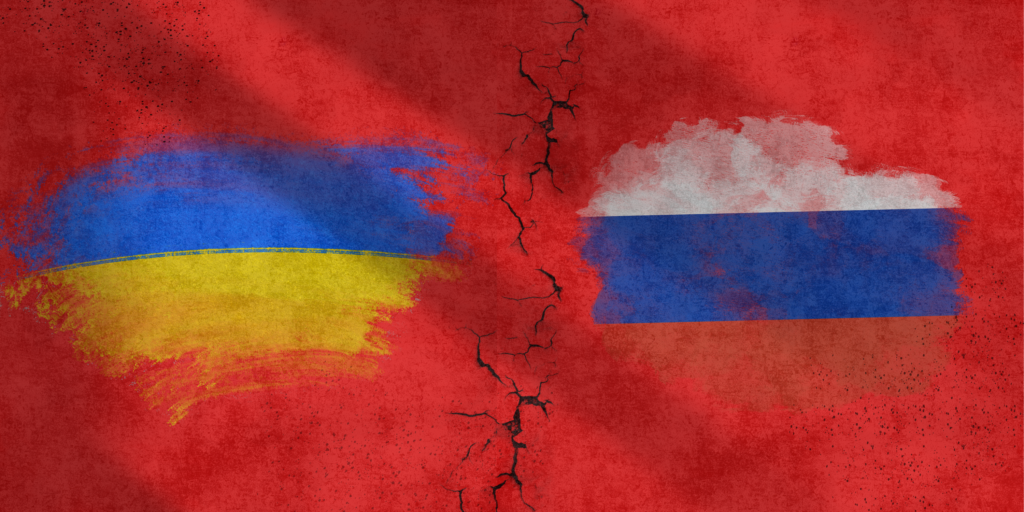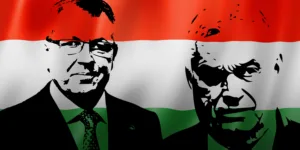China’s involvement in Ukraine is driven less by ideological alignment with Russia and more by a strategic effort to undermine the United States and secure access to vital resources and strategic positions that advance its long-term goals.
Key Takeaways:
-
China’s approach to the war in Ukraine is characterized by a dual façade, where its official rhetoric of peace and neutrality contrasts with strategic actions aimed at bolstering its global position against the United States.
-
China’s ambiguous narratives and subtle alignment with Russia serve to undermine US influence, while also promoting its leadership in the Global South as part of a broader geopolitical strategy.
-
China’s involvement in the Ukraine conflict is driven more by pragmatic long-term goals rather than ideological alignment with Russia.
Throughout the ongoing war in Ukraine, sparked by an unjustifiable act of Russian aggression, China has consistently emphasized the need for peace negotiations to end the conflict, even expressing a desire to play a larger role in the process. However, China’s tangible actions often appear to contradict its lofty official statements, revealing
an approach that is ambiguous, calculated, and seemingly driven by its goal of “rejuvenating” the Chinese nation by 2049.
By analyzing the narratives emerging from Chinese official statements regarding the war in Ukraine, and by contrasting China’s rhetoric with its actions, a clearer picture of its actual position begins to emerge. This article seeks to unravel that stance, exposing how China, under the guise of diplomacy and peacefulness, shrewdly navigates its political alliances, geopolitical interests, and long-term ambitions.
A diplomatic tightrope
Since Russia’s unprovoked attack on Ukraine on February 24th, 2022, Chinese officials have become acrobats on a diplomatic tightrope, balancing the need to maintain strong ties with Russia, preserve economic relationships with the West, and project an image of
a responsible, peace-loving superpower. The ambiguous and inflated narratives crafted by these “acrobats” are calculated steps along this tightrope, designed to further China’s interests.
At first glance, China’s stance on the conflict may seem difficult to decipher. On the one hand, Chinese Foreign Minister Wang Yi has expressed indirect support for Ukraine, advocating for the “respect and safeguarding of the sovereignty and territorial integrity of all countries” and adherence to the principles of the UN Charter. These statements, along with China’s calls for the UN Security Council to play “a constructive role in solving the Ukraine issue”, are useful in forging narratives of China being the guardian of international law and a peaceful world order.
On the other hand, China’s rhetoric often appears sympathetic to Russia and even echoes Russian propaganda. Notably, China has refrained from labelling Russia’s actions as
a “war,” instead referring to the situation as the “Ukrainian crisis.” Additionally, China has suggested that NATO’s expansion was a provocative force that compelled Russia to launch its “special military operation” in Ukraine, a narrative that aligns closely with Russian justifications. Wang Yi stated that “in the case of five consecutive rounds of NATO’s eastward expansion, Russia’s legitimate security concerns should be paid attention to and properly resolved.” China has also vocally opposed western sanctions against Russia.
Effectively, one could simply say that China believes that Russia had the right to be concerned about its safety and undertake actions to maintain it, but at the same time, Ukraine has the right to defend itself from Russia’s “military operation.” But if China is so neutral in this conflict, why is it so consistent in echoing Russian rhetoric and solidifying its image as a Russian ally in the eyes of the West, risking a significant backlash on the international stage, which would further strain its already vulnerable economy?
The answers begin to emerge when we dissect China’s official narratives and juxtapose them with its actions.
Narratives
Three key tendencies can be identified within Chinese official narratives on the war in Ukraine. First, China uses its communication about the war as an opportunity to praise and promote itself. In his “Five Points on the Ukraine Issue” from February 26th, 2022, Wang Yi described China as a “responsible major power” that has always played a constructive role in maintaining world peace and stability. He goes further, claiming that China has “never invaded other countries, engaged in proxy wars, sought to enlarge its spheres of influence, or participated in military bloc confrontations.” These claims are, of course, questionable, considering China’s involvement in the Korean War—“the first full expression” of proxy war during the Cold War—its border skirmishes with India and Nepal, and its ongoing military pressure on Taiwan.
Second, China’s focus has shifted towards the Global South throughout the conflict. Initially, Chinese officials engaged primarily with Western leaders, such as those from Germany, France, or Poland, regarding the Ukraine conflict. More recently, however, China has turned its focus on other countries, mainly from the Global South. One could say that this type of shuttle diplomacy, combined with China’s ongoing calls for peace negotiations, are the most logical moves. However, if that was the case, would not talking with Ukraine be already enough? Why would Li Hui, the Special Representative of the Chinese Government on Eurasian Affairs, travel through different continents all the way to countries such as Brazil, South Africa, or Indonesia to discuss the situation in Ukraine with them?
Officially it is because, according to the foreign ministry, “the crisis in Ukraine is the biggest geopolitical conflict after the end of the Cold War. Its impact is global, and no country can stay out of it. (…) Brazil, South Africa, Indonesia, and China are important members of the Global South and forces in promoting world peace and development.” However, another, less explicit reason is China’s sturdy ambition to become the friend, leader, and voice of the Global South. Of course, China does not do it only out of the goodness of its heart. It is a quid pro quo arrangement, in which China expects the Global South to support its mission of undermining the current western-made and US-dominated world order.
Finally, in its narratives vis-à-vis the war in Ukraine, China consistently seizes opportunities to criticize the United States. In its dialogues with the Global South, China frequently highlights the US’ role in global conflicts, aiming to foster skepticism or hostility towards America. For example, in interviews with South African and Indonesian media, Li Hui, China’s Special Representative on Eurasian Affairs, stressed that China is not providing any weapon components or dual-use goods to Russia, noting that over 60% of such supplies originate from the US and the West. This persistent criticism of the US reveals China’s true focus: countering American influence wherever possible, a strategy that becomes even clearer when China’s words are contrasted with its actions.
Realities
China’s actions in response to the Russian invasion of Ukraine reveal a complex and calculated strategy driven more by long-term ambitions than by ideology. It is important to recognize that Russia has effectively become a war economy, with many imports, including those from China, potentially contributing to its military efforts. Moreover, China has been exporting components used in military equipment to Iran and North Korea, both of which openly support Russia’s war in Ukraine.
However, China’s alignment with Russia is less about ideological solidarity and more about strategic opportunism. By leaning towards Russia, China strengthens its position against the US and secures economic benefits, such as cheaper energy imports from its northern neighbor. This relationship also ensures that Russia remains a weakened, pliant partner in Eurasia, one that will not obstruct China’s long-term plans. Additionally, a stable Russia secures China’s northern borders, allowing Beijing to focus its military resources on its southern and western fronts. In the event of a military confrontation over Taiwan, China would need a stable and sympathetic Russia to fully commit to any aggressive actions. Thus, Russia’s stability is crucial to China’s broader strategy.
However, China’s support for Russia does not imply full endorsement. Instead, China’s actions seem aimed at undermining and marginalizing US influence wherever possible. China perceives the war in Ukraine only through the lens of its own geopolitical goals, and this lens is pointed at only one country: the United States. Washington is the only power capable of thwarting China’s ambitions vis-à-vis Taiwan, which is key to the “rejuvenation of the nation.” It is why China is laser-focused on countering American influence wherever it can, and if it means leaning towards Russia in the Ukraine war, China will do precisely that.
Simultaneously, China provides limited support to Ukraine, particularly in areas that align with its strategic interests. For instance, China was the largest single buyer of Ukrainian grain under the Black Sea Grain Initiative, importing 8 million of the 33 million tons that Ukraine exported. However, with the collapse of this initiative in 2023, China has turned to other suppliers like Australia, Brazil, and the US. If China were to be cut off from these food imports—for example due to a military escalation in the Indo-Pacific—the consequences would be catastrophic for its population and its geopolitical ambitions. This underscores why China might prefer an independent Ukraine, economically integrated with the EU but militarily neutral and possibly under some degree of Russian influence. Such a scenario would offer China new markets, investment opportunities, and access to Ukraine’s chernozem, one of the most fertile soils on Earth.
Conclusions: China’s long game
China’s stance on the war in Ukraine reveals a carefully crafted dual approach that balances an official rhetoric of peace and neutrality with actions designed to serve its strategic interests. This duality reflects China’s broader ambition to challenge US global influence, secure its borders, and prepare for future conflicts, particularly over Taiwan. China’s ambivalence towards the Ukraine conflict, evident in its simultaneous outreach to the Global South and subtle alignment with Russia, underscores its pragmatic approach. By fostering relationships with nations outside the Western bloc, China aims to solidify its leadership in the Global South, creating a buffer against Western influence.
In this context, China’s involvement in the Ukraine war sends a clear message: despite its geographic distance from Ukraine, China demands recognition as a key player in resolving global conflicts. Ironically, by doing so, China mimics the very country it seeks to challenge—the United States, which has long played a dominant role in global affairs.






